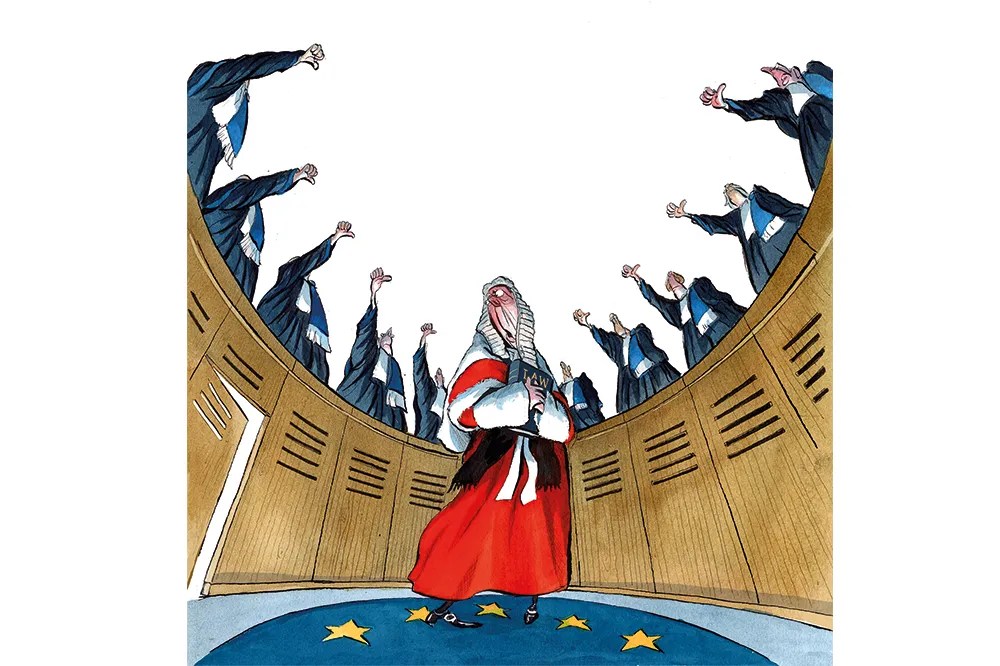Amidst the U-turns, if there is one thing on which Labour has remained almost rock-solid until now, it is human rights and the UK’s continued participation in the ECHR (European Convention on Human Rights). But even here things are changing.
ECHRexit, like Brexit once did, looks increasingly respectable
On Saturday, a group of Red Wall Labour members, led by Hartlepool MP Jonathan Brash, broke ranks and publicly called for the government to do something to stop ECHR being used to stymie the removal of criminals and other undesirables from the UK. They said that ‘huge numbers’ of others in Labour supported them. Even if that is an exaggeration, this is still very significant.
At this stage, it must be admitted that the initiative is pretty quixotic. The suggestion being made, as far as can be seen, is that ‘new guidance’ should be issued to the courts about applying the ECHR. This sounds plausible, but a moment’s thought shows it cannot fly. If the guidance is non-legislative the courts will ignore it. Judges are oath-bound to follow the law of the land rather than bow to administrative pressure.
Furthermore, it is a racing certainty that the senior judiciary would have some sharp words about government attempts to nobble the legal process. Legislation would solve this problem, but would be even more awkward. A law requiring judges to interpret the ECHR will, in the end, lead to a judgment against us in Strasbourg. If the European court disagrees with our legislation the government will either have to admit defeat by repealing it, or plot itself onto a collision course which inexorably leads towards ECHR withdrawal.
Despite their fighting words, one suspects the Red Wall caucus know this. They must realise that calling for an ECHR exit, or a Strasbourg stand-off, is an utter impossibility. Before the election, Labour consistently berated the Tories for disrespecting the European human rights system. A U-turn now would strip away any appearance of integrity.
This is before you get to the leadership, which is solidly supportive of the ECHR and the human rights industry behind it. Keir Starmer himself has a history of activism as a human rights lawyer; and on 30 January his Attorney-General and pal Lord Hermer, undoubtedly with his approval, declared in an official speech to the Council of Europe Britain’s complete loyalty to the ECHR and to all orders issued by the Strasbourg court.
But while this might be currently true, one suspects the Red Wall initiative to be less an effort to obtain immediate change than a desperate effort to woo voters away from Reform. Longer-term, however, it may well presage a big change.
For one thing, however uncomfortable it is for the government, Brash is right about the ECHR. As presently interpreted it seriously interferes with our ability to control our borders. The idea that the social relations of foreign criminals and unsuccessful asylum seekers, or the risks they face at home, should regularly trump our right to deport them is a major threat to our society. It is also an obvious perversion of the original ideals of the convention as ratified in 1951.
Secondly, there is little doubt that, outside a metropolitan intellectual bubble, the public by and large agree with him. As any pollster will confirm, voters overwhelmingly see our porous frontiers as a problem needing to be dealt with firmly. This is particularly true amongst Brash’s hard-pressed Red Wall constituents. It is they, rather than residents of the leafy bourgeois suburbs, who see their hotels taken over to house dubious characters and their townscapes and communities looking steadily more sordid and anarchic. You can’t blame the local members for voicing these concerns.
More to the point, it is worth noting the UK’s continued status as a member of the ECHR has historically dependend very strongly on Labour backing. Since 1997 this has become almost an article of faith, growing in parallel with Labour’s steady move towards its present support for a dreary kind of paternalistic technocracy.
But this consensus now lies broken. Even within Labour, human rights scepticism has now become expressible. With this development, it is worth speculating that we may be seeing the beginning of the end for Britain’s ECHR membership. Where will its backing come from if Labour enthusiasm cools? Patrician support from a from a rump of largely older Tory MPs is fast declining; Reform’s position is perfectly clear. The only parties consistently signed-up are the nationalists, Greens and Lib Dems. Most voters, meanwhile, are not that worried about the possibility of leaving the ECHR, especially if it might help with the immigration crisis.
It may take a long time. But ECHRexit, like Brexit once did, looks not only increasingly respectable, but likely to be ultimately successful.






Comments